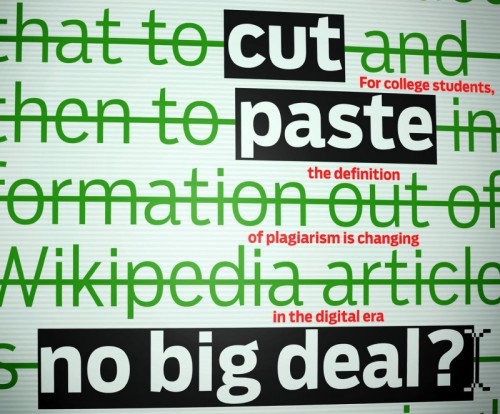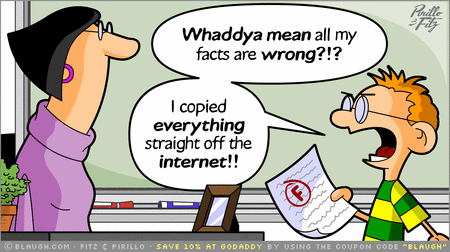Finals are a stressful time for students, as numerous deadlines—often requiring the accumulation of a semester’s worth of work—converge into one terrifying week. Pajamas stay on. Coffee gets brewed. Some thrive. Some sink. And a few, in a panic, copy/paste something directly from Wikipedia.
From the instructor side, finals are also stressful, but in a different way. Not only do we have to rush through stacks of papers, inputting senior grades in time for graduation, but we have to do so with the knowledge that this is the moment of truth—the moment where we find out how effective we have been all semester (if effective at all). Like our students, this process can bring moments of great triumph, such as grading a perfect test or reading a profound paper—one that perhaps even teaches us something. It can also bring defeat, where we must acknowledge that some students never truly engaged with the material. And finally, it brings sleepless nights (and probably an indignant Facebook status update) as we inevitably find the direct Wikipedia quote copied, pasted, and sometimes linked in a final paper.
I argue here that cases of internet plagiarism (such as text copied from Wikipedia and presented as original work in a final paper) is largely the result of a pedagogic failure to integrate contemporary technologies into the learning process. I want to qualify this argument in two ways. First, by saying that plagiarism is never okay, and the students who engage in it should (and usually do) know better. I think it would be less common, however, if we taught students how to effectively incorporate informal internet searchers into the learning process. Second, I qualify this argument by saying that the “failure” does not sit with any one particular instructor/educator, but with a shared pedagogical logic that has not kept up with the technologies of the time (there are of course many exceptions, such as Dan Greene’s American Studies course that he wrote about on this blog).
When in need of information, Digital Natives WILL Google. It is our responsibility, as educators, to help them Google responsibly. We can (and I argue should) teach students how Google, Wikipedia, YouTube and other similar sites can be effective research tools and content supplements.
When teaching students to conduct original research, instructors sometimes demonize Google and Wikipedia. They draw a hard and fast line between academic and non-academic sources, using Wikipedia as the counter example to the peer-reviewed journal article. To a degree, these instructors are correct. Wikipedia is not peer reviewed, and information can be inaccurate. Indeed, it is important that students can differentiate between different kinds of sources, and that they use the right kinds of sources in formal research papers. However, when beginning a literature review, on a topic about which one knows little, Google and Wikipedia are great tools.
I have taught two semesters of Advanced Methods of Research at Texas A&M. A large part of the course is for each student to conduct an original research project and write up a journal article style report. I find that students are often baffled and overwhelmed by the literature review process. The problem is not that they are unable to summarize and string together a series of related articles, but that they do not know where to begin looking for the right articles. They are unfamiliar with the substantive field in which they are studying and afraid that they will miss an essential piece of research. This is a problem common to all of us in the academy as we venture into unfamiliar research areas. So I tell my students to do what I do in this situation: Start with Google. This is met with wide eyes and giggles. I then instill in them that Google is a great place to start, but NEVER the place to end.
We talk about Google Scholar, tracking citations, and reference sections in Wikipedia. I then talk them through finding the full versions of these articles via the University library system, and further mining citations from there. In short, I help them start in a place they are comfortable (informal internet searches) so that they can more seamlessly move into less chartered territories (the realm of peer-reviewed journals and other academic sources).
Google and Wikipedia (and others) are also useful (when used wisely) for supplementing in-class content. Especially when teaching large classes, we often have students of varying levels and with very different backgrounds. Moreover, we sometimes forget that the students in our classes have not read everything that we have. As such, we inevitably reference (without explaining) a school of thought, framework, or social thinker with which they are not familiar. Here enters responsible Googling. Certainly the plethora of information on The Web can lead students astray, which is why we must talk with them about source differentiation (e.g. .edu or .org versus .com) and triangulation (do most places give similar facts/summaries?). Moreover, we need to make ourselves available to talk with students about the content that they’ve found—without making them feel as though they’ve somehow cheated by watching a YouTube video about postmodern thought.
Digital natives have special and unique skills. As educators, we can help hone these skills so that students can put them to optimal use. By de-stigmatizing informal internet searches, we not only broaden students’ intellectual scope, but also empower them to become more involved in their own processes of learning and education. .



Comments 8
LeeboZeebo — December 13, 2011
When I used to be a Writing Center tutor, there came a point where I actually had to create a special pamphlet for students indicating that Wikipedia is never a suitable, credible source for any written paper. I actually had a bullet point list of all the wonderful things Wikipedia can be used for (a starting point for research concepts, a supplement to existing data for better understanding, etc). At the time I was even able to provide a statistic on the number of plagiarisms caught the previous year where Wikipedia was the direct source of information. It was a polite way of saying, "We all know where you're looking, and you won't get away with it."
Prior to that pamphlet, I would ask every student who came in to see me whether they had copied from Wikipedia. The ones that didn't own up got "paper searched" and unfortunately roughly half of those were found to be liars and I had to write up incident reports like some kind of Essay Cop.
SOPA/PIPA » Cyborgology — January 18, 2012
[...] EDIT [1:24PM EST]- Buzzfeed has compiled “25 Angry Kids Who Can’t Do Their Homework Because of the Wikipedia Blackout.” While this is pretty funny, it also underscores the need for educators to not just say “don’t use wikipedia” but to help students use networked resources in an appropriate and effective manner. [...]